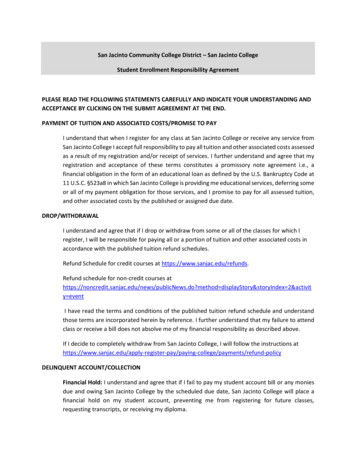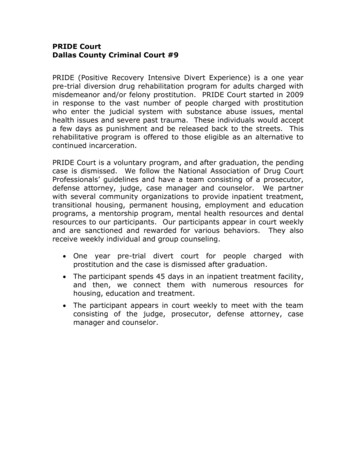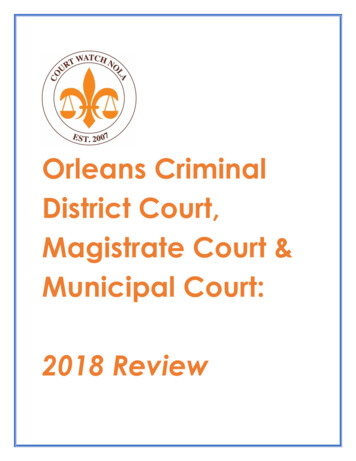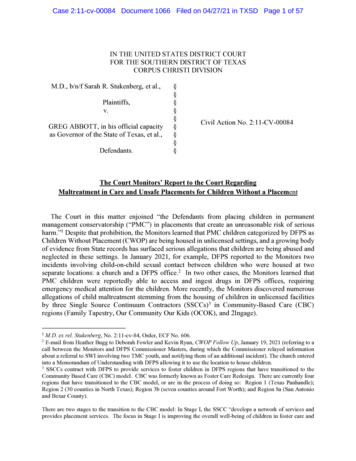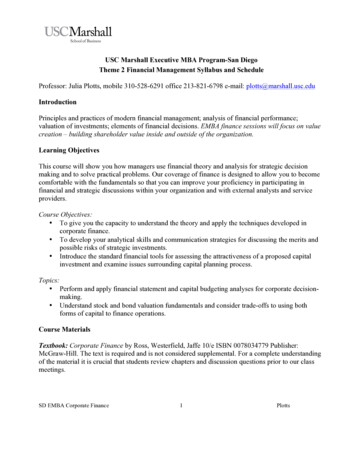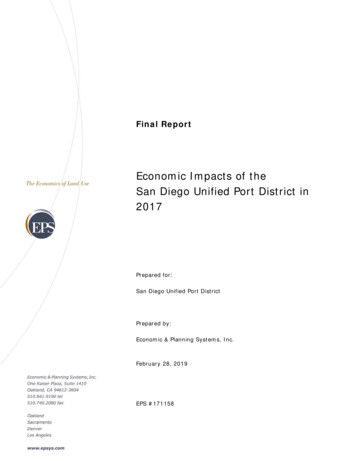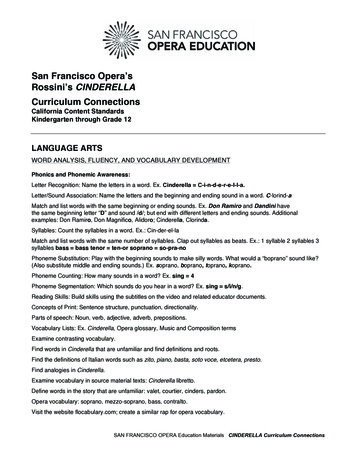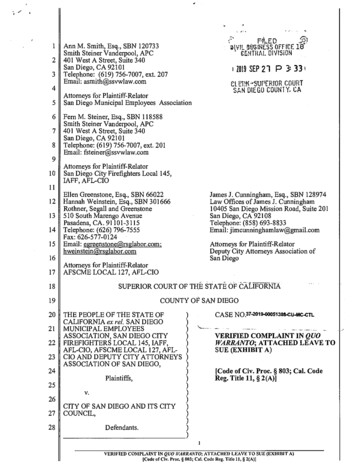
Transcription
,123Ann M. Smith, Esq., SBN 120733Smith Steiner Vanderpool, APC401 West A Street, Suite 340San Diego, CA 92101Telephone: (619) 756-7007, ext. 207Email: asmith@ssvwlaw.com45678Attorneys for Plaintiff-RelatorSan Diego Municipal Employees Association.PO.t.E D ZI,VIL 5ThIflESS OFFICE 18CENTRAL CI VISiON2019 SEP 21 P 3: 33 :CL Elli'eSUITRIOR COURTSAN DIEGO COURT Y. CAFern M. Steiner, Esq., SBN 118588Smith Steiner Vanderpool, APC401 West A Street, Suite 340San Diego, CA 92101Telephone: (619) 756-7007, ext. 201Email: fsteiner@ssvwlaw.com910Attorneys for Plaintiff-RelatorSan Diego City Firefighters Local 145,TAFF, AFL-CIO1112131415Ellen Greenstone, Esq., SBN 66022Hannah Weinstein, Esq., SBN 301666Rothner, Segall and Greenstone510 South Marengo AvenuePasadena, CA. 91101-3115Telephone: (626) 796-7555Fax: 626-577-0124Email: egreenstoneArsglabor.com ;hweinstein(Wrsglabor.com1617James J. Cunningham, Esq., SBN 128974Law Offices of James J. Cunningham10405 San Diego Mission Road, Suite 201San Diego, CA 92108Telephone: (858) 693-8833Email: jimcunninghamlaw@gmail.comAttorneys for Plaintiff-RelatorDeputy City Attorneys Association ofSan DiegoAttorneys for Plaintiff-RelatorAFSCME LOCAL 127, AFL-CIO18SUPERIOR COURT OF THE STATE OF eAL1F0RNIA19COUNTY OF SAN DIEGO202122232425262728THE PEOPLE OF THE STATE OF))CALIFORNIA ex ret SAN DIEGOMUNICIPAL EMPLOYEES)ASSOCIATION, SAN DIEGO CITY)FIREFIGHTERS LOCAL 145, IAFF,)AFL-CIO, AFSCME LOCAL 127, AFL- )CIO AND DEPUTY CITY ATTORNEYS)ASSOCIATION OF SAN DIEGO,))Plaintiffs,)))v.)CITY OF SAN DIEGO AND ITS CITY )COUNCIL, ))Defendants.))CASE NO,37-201940051303-CU-MC-CTLVERIFIED COMPLAINT IN QUOWARRANTO; ATTACHED LEAVE TOSUE (EXHIBIT A)[Code of Civ. Proc. § 803; Cal. CodeReg. Title 11, § 2(A)]VERIFIED COMPLAINT IN QUO JJ'ARRANTO; ATTACHED LEAVE TO SUE (EXHIBIT A)rode of Civ. Proc. § 803; Cal. Code Reg. Title 11, § 2(A)1
The People of the State of California ex rel. SAN DIEGO MUNICIPAL EMPLOYEESASSOCIATION ("MEA"), SAN DIEGO CITY FIREFIGHTERS LOCAL 145, IAFF, AFL-CIO,("Local 145"), AMERICAN FEDERATION OF STATE, COUNTY and MUNICIPALEMPLOYEES (AFSCME) LOCAL 127, AFL-CIO, ("Local 127"), and DEPUTY CITYATTORNEYS ASSOCIATION OF SAN DIEGO ("DCAA")(collectively "Plaintiff-Relators"),bring this verified complaint in quo warrant against Defendant CITY OF SAN DIEGO ("City")and its CITY COUNCIL ("City Council") pursuant to Code of Civil Procedure section 803.Introduction1.The remedy of quo warranto belongs to the State, in its sovereign capacity, to protectthe interest of the people as a whole and to guard the public welfare. Leave to bring this action hasbeen granted by the Attorney General.2.The provisions of a City charter become effective when filed with the Secretary ofState and these provisions are the law of the State with the force and effect of legislative enactments.(California Constitution, art. XI, § 3(a).)3.The State's sovereign interest, and the general public's interest, are uniquelyimplicated where a local agency amends its charter in violation of state laws which govern the locallawmaking process, including the Meyers-Milias-Brown Act ("MMBA").4.Quo warrant() is Latin for "by what authority." In certain quo warranto actions, the"authority" question focuses on whether a charter city's placement of an initiative measure on theballot without bargaining under the Meyers-Milias-Brown Act ("MMBA"), Government Codesection 3500, et seq., was an unlawful exercise of the city's franchise. (Bakersfield Police OfficersAssociation (2012) 95 Ops.Cal.Atty.Gen. 31; People a reL Seal Beach Police Officers Assn. v. Cityof Seal Beach (1984) 36 Ca1.3d 591 [Seal Beach].)5.When a charter city places an initiative on the ballot which is intended to affectmatters within the scope of representation without first complying with the meet-and-conferrequirements of the MMBA, a procedural irregularity in the legislative process occurs and theresulting charter amendment, if approved by the voters, represents an unlawful exercise of the city'sfranchise rendering the charter amendment invalid.(Seal Beach, supra, 36 Ca1.3d at 595;2VERIFIED COMPLAINT IN QUO WARRANTO; ATTACIIED LEAVE TO SUE (EXHIBIT A)[Code of Civ. Proc. § 803; Cal. Code Reg. Title II, § 2(A)I
IBakersfield Police Officers Association (2012) 95 Ops.Cal.Atty.Gen. 31; Fresno Police Officers and2Firefighters Associations (1993) 76 Ops.Cal.Atty.Gen. 169, 171 173; City of Palo Alto v. PERB3(2016) 5 Cal.App.5th 1271, 1316-1317; L4FF, Local 1319 v. City of Palo Alto (2017) VERB4Decision No. 2388a-M.)-5A Dispositive Determination Requiring Invalidationof City's Proposition B Charter AmendmentsHas Been Made By the California Supreme Court676.Plaintiff-Relators bring this action on behalf of the People of the State of California8to seek issuance of a writ in quo warranto declaring invalid and striking from the San Diego City9Charter all provisions added effective July 20, 2012, by operation of the "Proposition B" charter10amendment. This result is required under the quo warranto precedent established by the California11Supreme Court in Seal Beach because the City of San Diego violated section 3505 of the MMBA12in connection with its Proposition B charter amendments —just as the City of Seal Beach did — by13putting proposed charter amendments before the voters while failing and refusing to bargain.14(Boling v. Public Employment Relations Board (2018) 5 Ca1.5th 898 [Boling I].)157.In Boling I, the Supreme Court reversed the Court of Appeal, rejecting its attempt to16distinguish Seal Beach by finding that no section 3505 obligation attached to the City's Proposition17B legislative process because Proposition B was a citizen-sponsored initiative and not a proposal18by the governing body." (Id. at 916.)198.By unanimous opinion, the Boling Supreme Court reversed the Court of Appeal to20uphold PERB's Decision in favor of Relators on their unfair labor practice charges. Boling I held21that section 3505 of the MMBA extended to the mayor's sponsorship of the Proposition B Initiative.22(Id. at 918.) "Mayor Sanders conceived the idea of a citizens' initiative pension reform measure,23developed its terms, and negotiated with other interested parties before any citizen proponents24stepped forward. He relied on his position of authority and employed his staff throughout the25process. He continued using the powers of office to promote the Initiative after the proponents26emerged." (Id. at 916.) Since "the mayor was the city's chief executive, empowered by the city27charter to make policy recommendations with regard to city employees and to negotiate with the28city's unions, under the terms of section 3505, he was required to meet and confer with the unions3VERIFIED COMPLAINT IN QUO WARRANTO; A'FFACH ED LEAVE TO SUE (EXHIBIT A)[Code of Cir. Proc. § 803; Cal. Code Reg. Title 11, §2(A)1
1prior to arriving at a determination of policy or course of action on matters affecting the terms and2conditions of employment." (Ibid.) "The obligation to meet and confer did not depend on the means3he chose to reach his policy objectives or the role of the city council in the process." (Id. at 919.)4"Because the mayor was directly exercising his executive authority on behalf of the city, no resort5to agency principles is required to bring him within the scope of section 3505."6relevant question is whether the executive is using the powers and resources of his office to alter7terms and conditions of employment. Here the answer is plainly "yes." (Ibid.)8(Ibid.) "The14Sanders informed San Diegans that he would place a pension reform measure on theballot as part of his "agenda to streamline city operations, increase accountability andreduce pensions costs . . . by the time he leaves office." In his state of the cityaddress, he formally recommended to the city council the "policy" of substituting401(k)-style plans for defined benefit pensions, as well as the 'course of action" ofpursuing reform by way of a citizens' initiative measure. He pledged to work withothers in city government to achieve this goal, and he did. He and his staff weredeeply involved in developing the proposal's terms, monitoring the campaign insupport of it, and assisting in the signature-gathering effort. He signed ballotarguments in favor of the measure as "Mayor Jerry Sanders." He consistentlyinvoked his position as mayor and used city resources and employees to draft,promote, and support the Initiative. The city's assertion that his support was merelythat of a private citizen does not withstand objective scrutiny." (Id. at 919.)159.910111213"When a local official with responsibility over labor relations uses the powers and16resources of his office to play a major role in the promotion of a ballot initiative affecting terms and17conditions of employment, the duty to meet and confer arises." (Boling I at 919.) Whether an18official played such a major role will generally be a question of fact, on which PERB's conclusion19is entitled to deference. (§ 3509.5, subd. (b).) Substantial evidence supports PERB's conclusion20here that Sanders's activity created an obligation to meet and confer. (Ibid.)2110.The Boling I Supreme Court answered, in part, the question left open in Seal Beach22at page 599, footnote 8: "Needless to say, this case does not involve the question of whether the23meet-and-confer requirement was intended to apply to charter amendments proposed by initiative."24Boling /holds that the meet-and-confer requirement does apply where the initiative is sponsored and25promoted by government itself. Boling I rejected the City's central contention that a Seal-Beach26style MMBA violation can never occur unless the City's City Council, not its Mayor, is making a27policy decision and determining a course of action to change pensions for represented City28employees. As PERB concluded, and Boling I agreed, the command of MMBA section 3505 is not4VERIFIED COMPLAINT IN QUO WARRANTO; ATTACHED LEAVE TO SUE (EXHIBIT A)[Code of Civ. Proc. § 803; Cal. Code Reg. Tide II, §2(A)1
1limited to the City Council as governing body. Boling I explains that "allowing public officials to2purposefully evade the meet-and-confer requirements of the MMBA by officially sponsoring a3citizens' initiative would seriously undermine the policies served by the statute: fostering full4communication between public employers and employees, as well as improving personnel5management and employer-employee relations." (Boling 1 at 918-919, citing § 3500 and Seal Beach6at p. 597.)711.Having applied "settled law" to answer the two questions on which it granted review,8Boling I remanded the case to the Court of Appeal for review of PERB's remedial orders and to9"address the appropriate judicial remedy for the (MMBA) violation identified." (Id. at 920.)1012.On March 25, 2019, the Fourth District Court of Appeal upheld PERB's remedial11"cease and desist" and "make-whole" orders with minor modifications.12Employment Relations Board (2019) 33 Cal.App.5th 376 ("Boling 11'). (Exhibit 6 to this Verified13Statement.) Boling II upheld, without modification, PERB's order directing the City to take the14following affirmative action designed to effectuate the policies of the MMBA: "Upon request by15the Unions, join in and/or reimburse the Unions' reasonable attorneys' fees and costs for litigation16undertaken to rescind the provisions of Proposition B, and to restore the status quo as it existed17before the adoption of Proposition B." Noting that "it is apparent from PERB's Decision that PERB18does not believe the Initiative is valid," the Boling II court concluded that litigation directed at19rescinding the provisions of Proposition B and restoring the status quo ante should be decided in20a quo warrant proceeding. (Boling II at 384-386.)2113.Boling v. PublicGeneral law prevails over local enactments of a chartered city, even in regard to22matters which would otherwise be deemed to be strictly municipal affairs, where the subject matter23of the general law is of statewide concern. (Boling I at 915, citing Seal Beach at p. 600.)2414.After the Proposition B charter amendments took effect, the City has acted and25continues to act under the color of authority provided by these defective and invalid charter26amendments by denying all City employees newly hired on and after July 20, 2012, except sworn27police officers, any access to City's defined benefit pension plan. In so doing, City has usurped,28intruded into, and unlawfully held and exercised powers not belonging to it.5ToVERIFIED COMPLAINT IN QUO WARRANTO; ATIACHED LEAVESUE (EXHIBIT A)[Code of Civ. Proc. § 803; Cal. Code Reg. Title 11, §2(A)1
115.To harmonize the duties and rights established under the MMBA with the2constitutional right to propose local initiative legislation, the City was required to engage in a good3faith meet-and-confer process over the Mayor's proposed changes in City's pension policy before4the City put the Proposition B charter amendments before the voters.516.Issuance of a writ in quo warranto invalidating the Proposition B charter amendments6and striking them from the San Diego City charter is necessary in furtherance of the State's7sovereign interest, to protect the general public interest, to provide the appropriate judicial remedy8for the violation identified in Boling I — as the high court directed (Boling I at 920) — and to comply9with controlling precedent in Seal Beach.1011Parties17.At all relevant times, Defendant City was a municipal corporation existing,12qualifying, and acting under a charter pursuant to State law and the California Constitution. As a13charter city, the City of San Diego remains subject to the same state laws as general law cities on14matters considered to be of "statewide concern."1518.Though its duly-elected members have changed, Defendant City Council serves and16has served at all relevant times as the City's legislative body entrusted with various powers specified17in Article HI of City's charter.1819.The four Union Plaintiff-Relators are recognized employee organizations under the19MMBA, Government Code section 3501. They are the exclusive bargaining representatives for City20employees who provide vital services to the City's estimated 1.42 million residents. The scope of21Plaintiff-Relators' representation includes all matters relating to employment conditions and22employer-employee relations, including, but not limited to, wages, hours, and other terms and23conditions of employment, including pension benefits. (Gov. C. § 3504.)242520.the employer of the bargaining unit employees Plaintiff-Relators represent.City's MMBA Obligations262728City is a public agency within the meaning of the MMBA (Gov. Code § 3501), and21.The MMBA has two stated purposes: (1) to promote full communication betweenpublic employers and employees; and, (2) to improve personnel management and employer6VERIFIED COMPLAINT IN QUO WARRANTO; ATTACIIED LEAVE TO SUE (EXHIBIT A)[Code of Civ. Proc. § 803; Cal. Code Reg. Title II, § 2(A))
1employee relations within the various public agencies. (Boling I at 914.) These purposes are to be2accomplished by establishing methods for resolving disputes over employment conditions and by3recognizing the right ofpublic employees to organize and be represented by employee organizations.4(Ibid.) The Legislature has set forth reasonable, proper and necessary principles which public5agencies must follow in their rules and regulations for administering their employer-employee6relations. (Ibid.)722.The MMBA requires the City to engage in a good faith meet and confer process8regarding pensions and other subject matter within the scope of representation prior to arriving at9a determination of policy or course of action. (Gov. C. §§ 3504, 3505.) The centerpiece of the10MMBA is section 3505, which requires the governing body of a local public agency, or its11designated representative, to meet and confer in good faith regarding wages, hours, and other terms12and conditions of employment with representatives of recognized employee organizations. (Boling13I at 913.) The duty to meet and confer in good faith has been construed as a duty to bargain with14the objective of reaching binding agreements. (Id. at 914.) MMBA obligations extend to and15include a charter city's proposals to amend its charter to affect or change matters within the scope16of representation. (Seal Beach)1723.At all relevant times, City and Plaintiff-Relators had agreements in effect known as18"Memoranda of Understanding" ("MOUs") which specified all terms and conditions of employment19including pension benefits. These MOUs were approved by the City Council, reduced to writing20and signed by the parties. (Gov. Code § 3505.1.) Under these MOUs, all new hires were required,21as a condition of employment, to become participants in City's defined benefit pension plans.2224.As recognized employee organizations under the MMBA, Plaintiff-Relators were at23all relevant times, on behalf of themselves and the employees they represent, beneficially interested24in the City's faithful performance of its obligations under the MMBA which is intended by the25Legislature to foster labor peace in California by promoting full communication between public26employers and their employees by providing a reasonable method of resolving disputes regarding27wages, hours and other terms and conditions of employment between public employers and public28employee organizations. (Gov. C. § 3500.)7VERIFIED COMPLAINT IN QUO WARRANTO; ATTACHED LEAVE TO SUE (EXIIIBIT A)[Code of Civ. Proc. § 803; Cal. Code Reg. Title II, § 2(A)]
125.The duty to bargain requires the public agency to refrain from making unilateral2changes in employees' wages and working conditions until the employer and employee association3have bargained to impasse. (Boling I at 914.)45626.It is undisputed that the pension benefit changes effected by Proposition B fell withinthe scope of the unions' representation. (Ibid.)27."On these facts," Mayor Sanders had an obligation to meet and confer with the unions7before pursuing pension reform by drafting and promoting a citizens' initiative to amend the City's8charter. (Id. at 913-914.)910Procedural Irregularity When Presenting Proposition B Charter Amendment to Voters28.By Ordinance 0-20127 adopted on January 30, 2012, the City Council placed the11"Comprehensive Pension Reform Initiative" on the June 5, 2012 ballot as "Proposition B."12Proposition B's purpose was to alter employee benefits and compensation by charter amendments13— notwithstanding the City's existing MOUs with Plaintiff-Relators establishing all terms and14conditions — including provisions to deny all new City employees except sworn police officers15access to City's defined benefit pension plan known as the San Diego City Employees' Retirement16System ("SDCERS").1729.At no time prior to January 30, 2012, did the City give notice and opportunity to18Plaintiff-Relators to engage in a good faith meet and confer process under MMBA section 350519regarding the pension and compensation changes covered by the proposed Proposition B charter20amendments. City excused its failure to bargain and, in response to multiple written demands to21bargain, defended its refusal to bargain on the basis that the proposed charter amendments did not22constitute a City proposal.2330.Proposition B was approved by the voters and took effect on July 20, 2012, adding24Sections 140, 141.1, 141.2, 141.3, 141.4, 150, and 151 to City Charter Article IX, amending Section25143.1 thereof; and adding Sections 70.1 and 70.2 to Article VII. Section 70.2 stated on its face that26it would be automatically repealed and removed from the Charter on July 1, 2018.272831.The Proposition B Charter amendments resulted in unilateral changes to terms andconditions of employment for employees represented by Plaintiff-Relators.VERIFIED COMPLAINT IN QUO IVARRANTO; ATTACIIED LEAVE TO SUE (EXIIIBIT A)[C
CITY OF SAN DIEGO AND ITS CITY ) COUNCIL, ) ) Defendants. ) ) PO E D .t. . ZI,VIL 5ThIflESS OFFICE 18 CENTRAL CI VISiON 2019 SEP 21 P 3: 33 : CL Elli'eSUITRIOR COURT SAN DIEGO COURT Y. CA James J. Cunningham, Esq., SBN 128974 Law Offices of James J. Cunningham 10405 San Diego Mission Road, Suite 201
